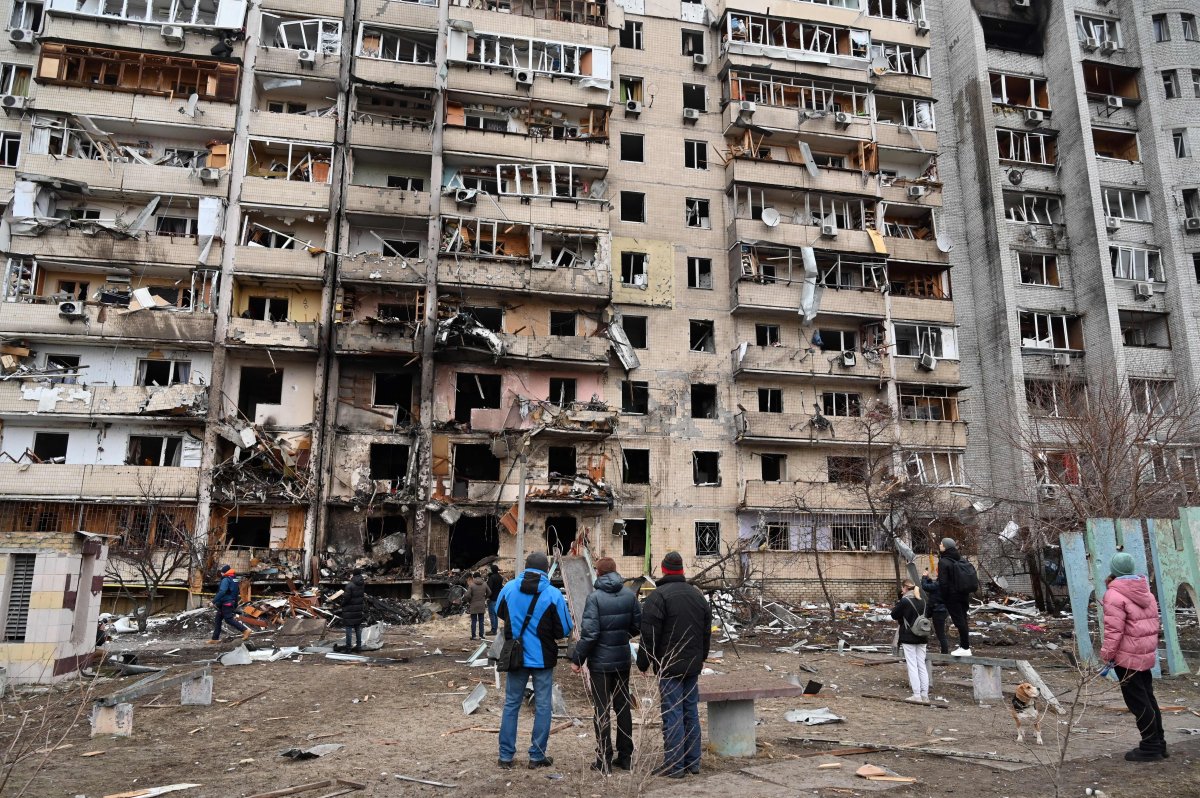Two days into Russia’s invasion of Ukraine, with Russian troops bearing down on capital Kyiv, with shelling and fighting reported in cities across the country, and with casualties mounting, members of London, Ont.’s Ukrainian community can only watch with horror.

For Lana Stryhun, a broadcast journalism student at Fanshawe College, it’s a longtime nightmare come to life.
“All my life I’ve been raised and I’ve been taught that Russian people will come and try to get our land,” she told Global News on Friday. “This was not a surprise for me, but it hits hard because you never thought it would be in reality.”
Russia’s invasion began early Thursday with missile strikes on cities and military bases, followed by a multipronged ground assault that rolled troops in from separatist-held areas in the east; from the southern region of Crimea, which Russia annexed in 2014; and from Belarus to the north.
The invasion followed weeks of military buildup by Russia, with President Vladimir Putin repeatedly denying that he was planning to invade the country. Putin has accused the U.S. and its allies of ignoring Russia’s demands to prevent Ukraine from joining NATO and for security guarantees.
By Friday, Russian troops were closing in on Kyiv, and there were growing signs that Putin may be seeking to overthrow Ukraine’s government. It’s unclear how much of the country remains under Ukrainian control.
Stryhun says she has been in frequent contact with her family back home in Cherkasy, a city located about 190 kilometres southeast of Kyiv along the Dnieper River in central Ukraine.
“I wake up and the first thing I do is (check) news, and the second is I call my father and ask whether some of (the) news is right or wrong,” she said.
“He tries to encourage me and say that ‘everything is going to be alright,’ that ‘we are strong. We will take our territory back.’ I am sure we will.”

Get breaking National news
Ukrainian officials have reported at least 137 deaths on their side and claimed hundreds on the Russian front. Russian authorities have released no casualty figures and it was not possible to verify the tolls.
United Nations officials reported 25 civilian deaths, mostly from shelling and airstrikes, and said that 100,000 people were believed to have left their homes, estimating up to four million could flee if the fighting escalates.
Stryhun’s 55-year-old father, a political journalist, is among those Ukrainian men aged 18 to 60 who are currently barred from leaving the country in order to fight, following the introduction of martial law.
“I just called my father this morning, and he said that everyone wants to kill a Russian. Even a grandmother in the city. She just wants peace, but this peace cannot be gained just by talking with Putin or trying to … protest him by words,” Stryhun said.
“Everyone in my city wants to get (a) weapon and to go (to) war because it’s the only way we can keep our land alive, our people alive.”
In school, she says, she and others had lessons about “the defence of our land.”
“Trying to think ‘from who we can defend? Maybe from Poland? Maybe from NATO? … No, from Russia, because we know what they can do,” she said.
“They are lying the whole time, trying to say that they are innocent and their troops are getting there just to install peace in the country. No, we would live peaceful if Russia didn’t exist.”
Ukraine’s embattled president, Volodymyr Zelenskyy, has pleaded for further Western assistance as Russian troops advance further into the country, including on the country’s capital. Zelenskyy has described himself as being Russia’s No. 1 target.
Zelenskyy offered to negotiate on a key Putin demand: that Ukraine declare itself neutral and abandon its ambition of joining NATO. The Kremlin initially said it was ready to send a delegation to Belarus, then later backpedaled, saying it preferred to meet in Warsaw. Russian Foreign Minister Sergey Lavrov suggested it was too late, saying Zelenskyy should have agreed to talks earlier on.
NATO Secretary-General Jens Stoltenberg said Friday that U.S. President Joe Biden and his counterparts had agreed to send parts of the organization’s response force to help protect allies in the east.
Putin made clear earlier this week that he sees no reason for Ukraine to exist, raising fears of possible broader conflict in the vast space that the Soviet Union once ruled. Ukraine regained independence in 1991 when the union dissolved.
Among Putin’s pledges was to “denazify” Ukraine. The Kremlin equates members of Ukrainian right-wing groups with neo-Nazis. Zelenskyy, who is Jewish, angrily dismisses those claims.
Since the invasion began late Wednesday night Ontario time, Stryhun says she has been having a hard time sleeping and has been having nightmares, some connected with bloody videos she has been seeing online from back home.
“I am worried because it is a war. It’s awful. It’s a crime against humanity,” she said. A particular worry, she says, is over the safety of her political journalist father in the event Russian forces arrive in Cherkasy.
“If they come, the first thing they will do is kill journalists. We all know it,” she said. “Because journalists are the third power in the country, and they are sharing news. So I know that he will be killed if he doesn’t resist. But I know he will.”
Canada and other global powers have slapped economic sanctions on Russia in the wake of the invasion, and some have pushed to remove Russia from SWIFT, the dominant system for global financial transactions.
The U.S. said Friday that it would follow the European Union in imposing sanctions on Putin and Lavrov over the invasion.
— with files from the Associated Press and The Canadian Press















Comments